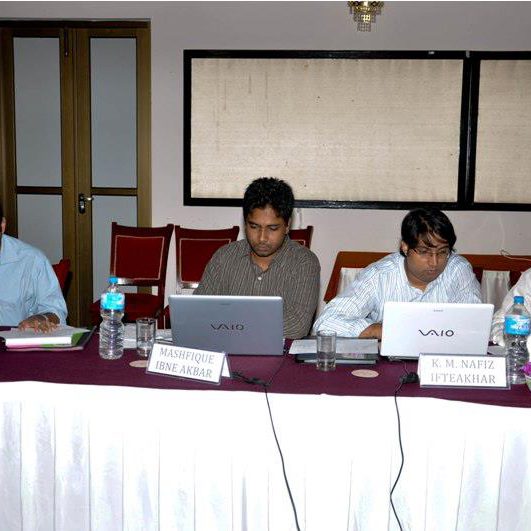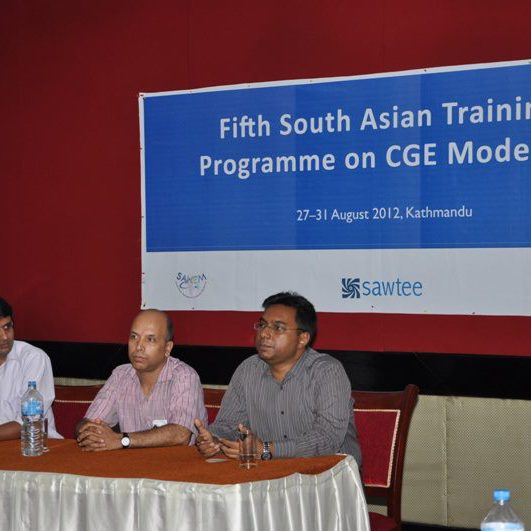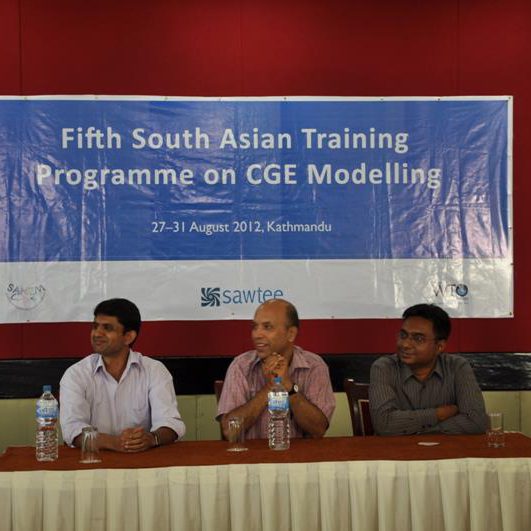Youth Perspective On Covid-19 Crisis In Bangladesh
SANEM-ActionAid Bangladesh Webinar
9 May 2020, Dhaka

A webinar titled “Youth Perspective on Covid-19 Crisis in Bangladesh: Response through National Budget and Planning“, jointly organized by South Asian Network on Economic Modeling (SANEM) and ActionAid Bangladesh was conducted on Saturday, May 9, 2020, at 11 AM. Chaired by Ms. Farah Kabir, Country Director, ActionAid Bangladesh and moderated by Dr. Selim Raihan, Executive Director, SANEM and Professor, Department of Economics, University of Dhaka, the webinar was joined by around 65 participants including private sector representatives, development practitioners, teachers, and students. The webinar hosted a panel discussion where present as panelists were: Dr. Sayema Haque Bidisha, Research Director, SANEM and Professor, Department of Economics, University of Dhaka, Mahtab Uddin, Research Fellow, SANEM and Lecturer, Department of Economics, University of Dhaka, Zubayer Hossen, Research Economist, SANEM and Nazmul Ahsan, Manager-Young People, ActionAid Bangladesh. The two-hour long panel discussion was followed by an interactive question-answer session. As the webinar was streamed live on the Facebook pages of SANEM and ActionAid Bangladesh, students, and young people shared their thoughts and views on the effects of the pandemic and their recommendations with the audience of the webinar.
In her introductory remarks, Ms. Farah Kabir shared her observations on the ongoing pandemic and its subsequent effects on the youth of Bangladesh. She reflected on her experience as a development practitioner and presented her analysis of the current crisis. She said that one of the most important aspects of any crisis is the effect of the crisis on the youth. In tackling the challenges of the COVID-19 Pandemic, it is important to take into consideration the issues of the youth. These issues have social and economic aspects as well as the mental health aspects. She stressed the requirement of national planning and targeted policy interventions to address the issues of the youth in the current context.
Dr. Raihan presented the research by SANEM on the effect of the COVID-19 Pandemic on the youth of Bangladesh. The research identified six transmission mechanisms through which the youth of the country are being affected: Health, Education, Employment, Income, Poverty, and Domestic Violence. Dr. Raihan also presented recommendations regarding the youth scenario. The recommendations are:
- Provide health coverage and engage the most vulnerable youth group in the health care packages to meet up their basic needs.
- Inclusive education – Public-Private Partnerships to widen access to distance learning tools free of cost, expand the capacity of networks without demand surges. Education requiring robust social protection expansions.
- Extend social safety net to include unemployed youths (social assistance, public employment programmes), create employment retention schemes, tax reliefs or interest-free loans to SMEs operated by youths.
- Motivate and engage youth in skill development programmes (development of ICT sector, vocational training) to grab income sources.
- Introduce the strategy to tracking the real poor and help them through proper channels like cash transfers, interest-free loans, debt relief.
- Allocations to launch emergency helplines, finance relevant organizations to develop shelters and support services, train police on how to respond and protect victims considering social stigma around this issue
The presentation by Dr. Raihan was followed by Dr. Sayema Haque Bidisha’s remarks. Dr. Bidisha highlighted the issues of mental health of the youth. She observed that the current lockdown is, in most cases, negatively affecting the youth with already existing psychological conditions. The current situation is fueling frustration and desperation which are often being manifested through domestic violence. She expressed her concern that anti-social activities might increase due to deterioration in collective mental health. Dr. Bidisha also sheds light on the advent of the fourth industrial revolution in relation with the current pandemic. She emphasized on the necessity of national preparation and economic diversification in this regard. Issues of employment and skill mismatch which are now being worsened by the pandemic were also discussed by Dr. Bidisha. She put emphasis on government efforts to address the economic challenges for the youth.
Mr. Zubayer Hossen drew the webinar’s attention to the lack in the institutional capacity of Bangladesh and the disruptions in emergency responses these shortcomings are causing. He focused on the socio-economic state of the freelancers who are mostly young. Pointing out that there are five hundred thousand freelancers, Mr. Hossen explained that due to the pandemic the economic activities of these freelancers have decreased substantially, which subsequently will cause a drop in their incomes. The economic consequences of the freelancers decreasing share of income must be taken into consideration. Mr. Hossen also addressed the effect of the pandemic on start-ups. Since most startups are youth initiatives, he put emphasis on the requirement of specific stimulus packages targeting these startups.
Focusing on the young university students, Mr. Mahtab Uddin explained that a significant percentage of university students are at risk of subsiding below the poverty line. This will affect their higher education schemes. Mr. Uddin also explained that only 20% of the Bangladeshi youth have formal job facilities. The ensuing economic crisis will create huge difficulties for the youth employed in informal jobs. The potential of online education was also explored by Mr. Uddin and he shed light on the reality of students from rural areas. He also elaborated the obstacles in online education faced by students from rural areas. He recommended a waiver of tuition fees for university students and other special measures addressing the unique needs of students.
Mr. Nazmul Ahsan discussed the impacts of the pandemic on achieving Sustainable Development Goals. The current crisis is hampering government and non-government SDG initiatives. Therefore, a holistic approach is required in this regard. Mr. Ahsan also proposed preparing comprehensive data on the youth to identify their specific requirements and areas of assistance. Such data can be helpful in providing economic assistance, guidelines, and social safety packages.
Participants in the webinar voiced their own concerns regarding the effects of the pandemic on the youth. Many anticipated that there can be a rise in child labour. The economic hardships to be faced by the youth were also discussed in detail by participants. They shared their own recommendations and suggestions with the audience.
In her concluding remarks, Ms. Farah Kabir said that the pandemic is a call to action for social justice and rather than returning to the pre-pandemic situation where socio-economic exploitations were prevalent, the society must strive for a better socio-economic reality.
The closing remarks were delivered by Dr. Selim Raihan as he informed the participants in the webinar of SANEM’s proposals on tackling the economic challenges created by the pandemic. He expressed hope that with collaboration at all levels Bangladesh will be able to get through this crisis.





